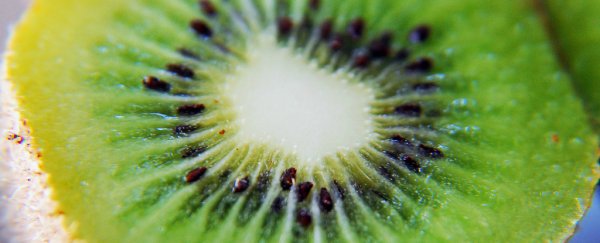A 46-year-old man has become allergic to kiwi fruit after receiving a bone marrow transplant from his kiwi-allergic sister, and for the first time, researchers have been able to confirm that the allergy originated in the donor cells.
Although scientists have previously seen patients develop new allergies following bone marrow transplant, this is the first time they've been able to conclusively demonstrate that a donor's bone marrow cells were responsible for triggering the reaction, and it paves the way for further insight into how allergies start - and, more importantly, how to treat them.
The man was given a bone marrow transplant as part of his leukaemia treatment, which means that doctors extracted hematopoietic stem cells - the 'parent cells' that give rise to all other types of blood cells - from his sister's bone marrow and transplanted them into him. The goal was for her healthy cells to repopulate his blood and immune cells.
The surgery was a success… until he decided to eat a kiwi fruit - something he'd never had any problem with in the past - and developed 'oral allergic symptom', which involves tingling and swelling of the lips, mouth, and/or throat.
The researchers decided to investigate what was going on, and managed to isolate the specific cells in his blood that were reacting to the presence of kiwi fruit. They then were able to use a technique known as fluorescent in situ hybridisation (FISH) to confirm that these cells had originated from his sister's bone marrow transplant.
"FISH analysis proved that hematopoietic cells of the male recipient completely originated from the female donor," the researchers report.
The scientists still aren't entirely sure how this process occurs - an allergy is triggered when our immune system thinks a harmless substance, such as kiwi fruit, is dangerous and needs to be attacked, with potentially fatal results.
In this case, it appears that the sister's stem cells had somehow carried with them the message that kiwi fruit was the enemy, and passed that onto all the new cells derived from them. But researchers now need to investigate the process responsible for this, which could help them better understand what triggers allergies in the first place.
This is not the only surgery known to spread allergies - in very rare cases, blood transfusions can transfer temporary allergies - just last year, a young boy developed fish and peanut allergies following a transfusion.
But these allergies fade after surgery because the active allergy cells are eventually replaced. This research, on the other hand, suggests that allergies spread by bone marrow transplant will be long-lasting, seeing as it's the parent cells that carry the allergy.
Bone marrow transplants can also have the unique side effect of changing a person's blood type, for example turning type A into type O, depending on the donor.
The big question now is, if bone marrow transplants can spread food allergies, can they also treat them? This study opens the door to further investigation into that topic - and with the rate of allergies increasing rapidly among children, it couldn't come sooner.
The research has been published in the Journal of the European Academy of Dermatology and Venereology.
And just in case you needed a reminder, don't forget kiwi allergies can be pretty terrible.

